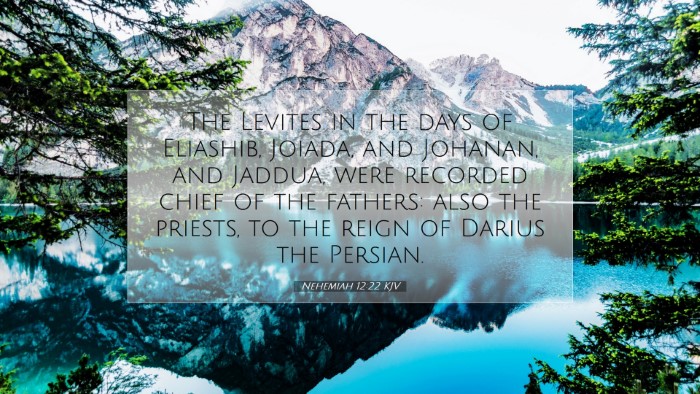Commentary on Nehemiah 12:22
Nehemiah 12:22 states:
"The record of the priests and Levites who had been heads of the fathers’ houses until the days of Eliashib the son of Joiada, the son of Joshua, the son of Jehozadak, and until the days of Nehemiah the governor, and of Ezra the priest and scribe."
Introduction
Nehemiah 12:22 is a significant verse within the context of restoring the Jewish community post-exile and highlights the continuity of priestly service. This verse not only connects the leadership of the Israelites but also emphasizes the importance of maintaining historical records within the worshiping community. The insights from public domain commentaries provide a rich understanding of the verse’s implications.
Contextual Background
The book of Nehemiah focuses on the reconstruction of Jerusalem and the reform of the people following their Babylonian exile. Nehemiah himself was appointed governor and worked closely with Ezra, who served as a priest and scribe. Together, they played crucial roles in not only rebuilding the city walls but also in spiritual renewal.
Significance of the Historical Record
According to Matthew Henry, the recording of the priests and Levites’ lineage serves several vital purposes:
- Continuity of Leadership: It establishes the ongoing and consistent line of priestly authority vital for religious practices.
- Accountability: It holds the spiritual leaders responsible to their ancestral duties and to God, reinforcing the significance of their responsibilities.
- Preservation of Identity: It reminds the people of their covenantal identity, ensuring they understand their place as God’s chosen nation.
Priestly and Levitical Duties
In exploring the roles of priests and Levites, Albert Barnes notes that their functions were essential for the rites and rituals prescribed in the Mosaic Law. These individuals were tasked with a sacred responsibility to mediate between God and the people:
- Cultic Functions: They performed sacrifices and maintained the temple, enabling worship practices central to Israel's identity.
- Instruction: They were responsible for teaching the Law to the people, ensuring that God's words were passed down through generations.
Historical Context and Leadership
Adam Clarke emphasizes the importance of naming Eliashib, Joiada, Joshua, and Jehozadak, linking the present with the past. This genealogical record highlights:
- The Priestly Lineage: It maintains the connection back to Aaron, the brother of Moses, establishing a direct link to the original priesthood.
- Rebuilding Leadership: During a crucial time of rebuilding, it serves to unify the people under recognized and respected leaders.
- Covenant Faithfulness: The verse reflects God’s faithfulness in preserving the lineage of His servants, even through the trials of exile.
The Role of Nehemiah and Ezra
The mention of Nehemiah and Ezra in this verse affords recognition to their pivotal roles in the restoration efforts. Nehemiah, as governor, and Ezra, as priest and scribe, initiate reformative measures that are both practical and spiritual:
- Nehemiah's Governance: Nehemiah's leadership exemplifies effective civil governance under God’s guidance, as he encouaged the resettlement of Jews and the restoration of the walls of Jerusalem.
- Ezra's Teaching: Ezra’s dedication to teaching extends the significance of the Law, ensuring that religious practices and moral living inform the community's revival.
Theological Insights
From a theological perspective, Nehemiah 12:22 invites reflection on the authority of God's leaders and the significance of historical continuity within faith communities. Matthew Henry underscores the notion that:
- God's Sovereignty: The records symbolize God’s sovereignty in establishing leadership during tumultuous times.
- Faithfulness to the Covenant: It affirms the faithfulness of God in fulfilling His promises through structured leadership.
Practical Application
For modern pastors, students, and scholars, Nehemiah 12:22 challenges us to consider the importance of leadership in spiritual matters:
- Historical Awareness: Understanding church history and heritage to see how God has worked through generations.
- Accountability in Leadership: Recognizing the weight of the call to leadership and the need for integrity and accountability.
- Commitment to Teaching: Emphasizing the vital role of teaching scripture and preserving theological fidelity in contemporary settings.
Conclusion
In summary, Nehemiah 12:22 encapsulates the importance of priestly lineage and the continuity of worship. It invites us to recognize God's guiding hand throughout history and challenges us to be faithful stewards of His Word in our communities. Understanding this verse within its broader context empowers us to appreciate the significance of God’s work through human agency, reminding us that we are part of a rich spiritual heritage.


